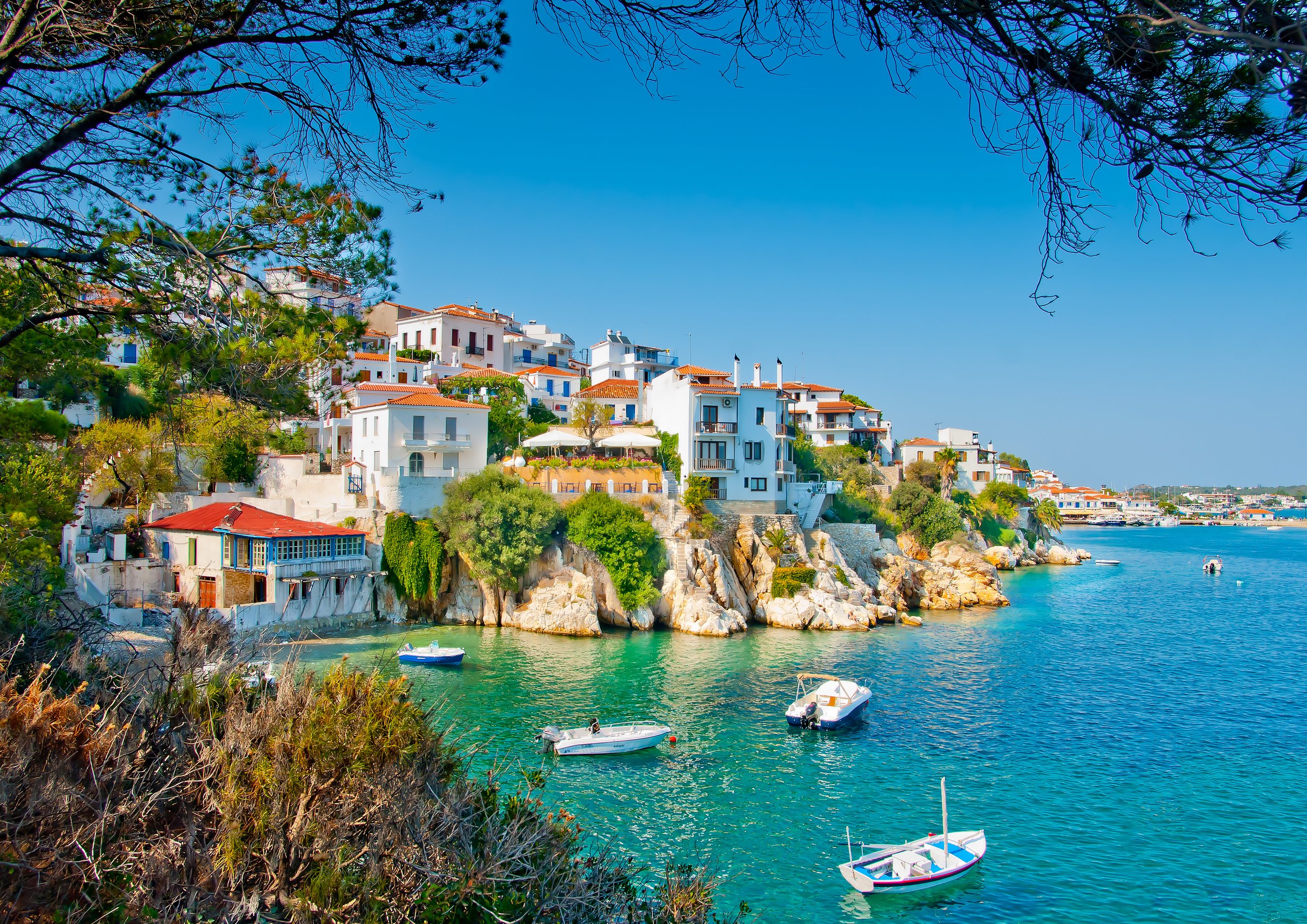Whether you’re picturing a slower pace of life on the islands, remote working from a terrace in Thessaloniki or building a rental portfolio in Athens, Greece offers several residency routes for non-EU buyers. In this guide, we’ll walk you through who needs a permit, the visa options available and what to expect from the application process.
If you’re planning to spend more time in Greece – perhaps to enjoy long holidays at your second home or retire by the sea – and you’re not an EU national, you’ll need a residency permit. From eligibility rules to visa types and paperwork, it’s essential to understand the steps involved if you want to stay beyond the 90-day Schengen limit.
Download the Greece Buying Guide
Contents
Who needs a residency permit?
If you’re from an EU or EEA country, you don’t need a visa to live in Greece, but you will need to register with the authorities if you plan to stay longer than 90 days. This registration allows you to remain legally in Greece without restrictions.
If you’re a non-EU national – including UK and US citizens – you’ll need a visa for longer stays. Without one, you’re limited to just 90 days in any 180-day period across the Schengen Area, which includes Greece. That means short holidays are fine, but if you want to spend winter and summer at your Greek property or live there part-time, a residency permit is a must.

Can I own property without residency?
Yes, absolutely. There’s no restriction on foreigners buying property in Greece, even if you’re not a resident. You can own a home, rent it out for income, and use it for holidays without needing to live there full time.
However, time spent at your property still counts towards the 90-day Schengen limit. So if you’re planning to spend more than three months at a time in Greece, or you’re planning to settle there permanently, you’ll need to apply for a visa and residency permit.
Some overseas buyers find the 90-day rule suits their lifestyle – perhaps spending spring in Greece, returning home for the summer, and heading back for the quieter autumn months. But if you want more freedom, a visa is worth pursuing.
Types of visas for Greece
Greece offers a few different visa types suitable for non-EU buyers. Here’s a breakdown of the most relevant options for second-home owners, retirees and remote workers.
| Visa type | Main requirement | Initial validity |
|---|---|---|
| Financially independent (FIP) | €3,500/month passive income or €48,000 in savings | 3 years |
| Golden visa | €250k-€800k property or capital investment | 5 years |
| Digital nomad | €3,500/month remote salary | 1 year (renewable every 2 years) |
Financially independent visa (FIP)
Perfect for retirees or those living off savings, pensions or rental income. You’ll need a steady monthly income of at least €3,500 (or €42,000 annually), plus 20% extra for a spouse and 15% for each child.
You’ll also need to show you’re not working – a pension statement or letter from your former employer should suffice – and if your income isn’t enough, you can instead deposit €48,000 in a Greek bank account. The application costs €1,000 and processing usually takes up to three months. This visa allows you to bring your family and is renewable.
Golden visa
Download the golden visa guide
This option is available if you’re planning to invest significantly in Greece. The property investment must meet one of these thresholds:
- €800,000 in Attica, Thessaloniki, Santorini, Mykonos or any island with a population over 3,100
- €400,000 in the rest of Greece
- €250,000 for restoration or development projects in some areas
Other investment routes include:
- Signing a 10-year lease with a hotel or tourist unit
- Investing €400,000 in a Greek company or government bonds
- Depositing €400,000 in a Greek bank
- Investing €800,000 in listed corporate or government bonds
There’s no requirement to live in Greece for this visa to remain valid. It’s ideal if you want the flexibility to come and go while retaining residency status.
Download the golden visa guide
Digital nomad visa
This is aimed at professionals working remotely for overseas employers. You’ll need:
- Proof of income over €3,500/month
- A fully remote job contract or freelance agreement
The visa lasts for 12 months initially and can be renewed in two-year increments. Spouses and dependents can join you, provided you meet the adjusted financial threshold.
Requirements for all visa applications
Regardless of which visa you apply for, you’ll need to meet these core requirements:
- Be over 18 years old
- Hold private health insurance that matches or exceeds Greek national health standards
- Have proof of accommodation (owned or rented)
- Provide a clean criminal record
- Hold an AFM number (Greek tax ID)
Speak to a Greece property expert
How to apply for a residency permit
Most applicants begin the process in their home country by applying for a long-stay visa at the nearest Greek consulate. You’ll need all your documents translated into Greek by a certified translator.
How to get permanent residency
EU nationals can apply after five years of continuous residency. For non-EU citizens, the requirement is seven years. Permanent residency means you can stay in Greece indefinitely.
You’ll need:
- Proof of consistent income
- Comprehensive health insurance
- A clean criminal record
- Evidence of cultural integration, including Greek language skills
You will need to take your completed application form and other documents, including a valid passport, to your local Aliens and Immigration Department. You will also need to provide biometric data (fingerprints, photos) and pay a €16 fee.
How to apply for Greek citizenship
Once you’ve held legal residence for seven consecutive years (or three if married to a Greek citizen or you have a Greek child), you can apply for citizenship.
Required documents include:
- A Declaration of Naturalisation submitted to your local municipality
- Your valid residence permit
- Your physical passport
- Certified and translated birth certificate
- Tax returns from the past two years
You will also need to pass a language proficiency test and prove your integration into Greek society by demonstrating your understanding of local customs, culture and politics.
Dual citizenship is permitted under Greek law, meaning you can keep your original nationality.
Frequently asked questions
Apply for the long-stay visa that matches your situation (for example, the financially independent visa, the golden visa or the digital nomad visa) at your nearest Greek consulate. Once in Greece, submit your residence permit application with translated documents, proof of accommodation, private health insurance, your AFM (Greek tax number) and a clean criminal record. You’ll provide biometrics at the Aliens and Immigration Department and pay the relevant fees. When approved, you’ll receive a residence card tied to the visa route you chose.
Timelines vary by route and local office workload. As a practical guide, allow several weeks for the entry visa and, once you’ve lodged your permit application in Greece, up to six months for processing. Complex cases, peak seasons or missing paperwork can extend this. Build in buffer time if you have travel plans tied to your move.
It depends on the route. The financially independent visa typically expects evidence of at least €3,500 per month in passive income (plus 20% for a spouse and 15% per child) or a savings alternative such as €48,000. The digital nomad route usually requires €3,500+ per month in remote employment or freelance income (higher if bringing family). Golden visa residency is investment-led, with property thresholds currently set at €800,000 in prime areas like Attica and Thessaloniki, €400,000 in the rest of Greece, and €250,000 for certain restoration or development projects; there are also non-property investment options from €250,000. Always check the latest requirements before applying.
You might also like:









